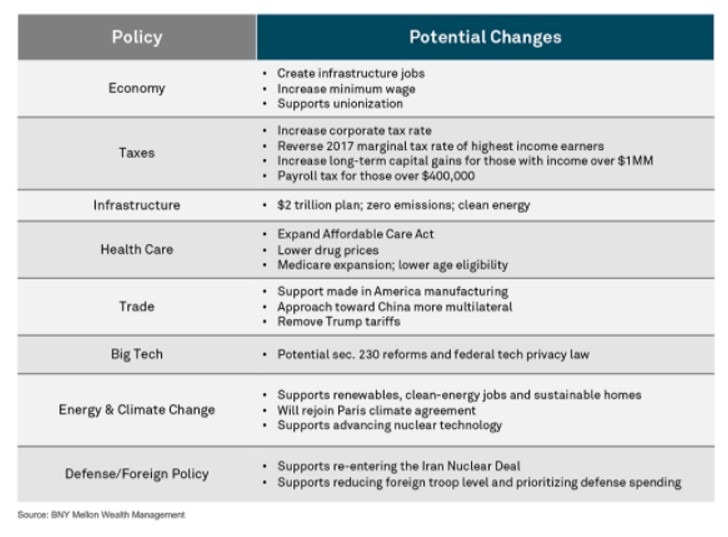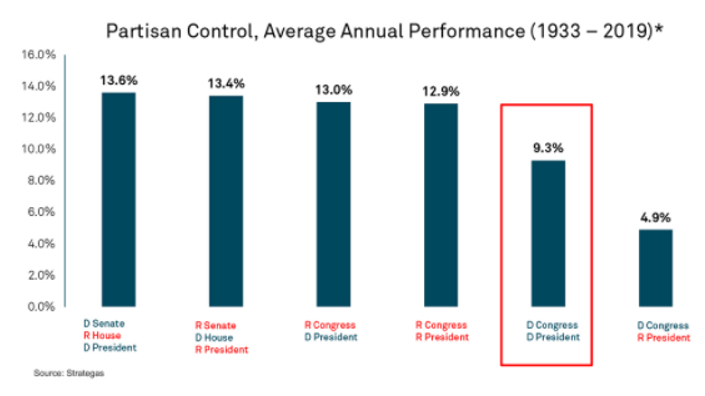Investment Strategies
US Elections Aftermath: The View From BNY Mellon Wealth Management

More commentary from the industry about the Georgia Senate run-off results and the approach of a Joe Biden Presidency. These views come from BNY Mellon Wealth Management.
The following comment comes from BNY Mellon Wealth Management and is republished here with permission.
The results of the 2020 election were made final on Wednesday,
two months after Election Day. It all came down to the pair of
runoff races in Georgia, where Democrats won control of the
Senate. With former Vice President Joe Biden winning the White
House, a 50-50 split in the Senate allows Vice President Kamala
Harris the deciding vote in a tie, handing Democrats the majority
in both chambers of Congress. The House and Senate also
convened on Wednesday in a joint session to count electoral
votes. We were saddened by the violent events at the
US Capitol in what is a normally symbolic affair affirming
the president-elect's victory.
Let’s take a look at what happened in Georgia, its impact on the
new administration’s policy priorities and what it may mean for
the markets and your portfolio.
What happened in Georgia
In two very competitive races, Georgia voters determined which
party controls the Senate. In one contest, Democratic candidate
Rev. Raphael Warnock defeated incumbent Republican Senator Kelly
Loeffler. In the other, Democrat Jon Ossoff defeated incumbent
Republican Senator David Perdue. This gives Democrats control of
both chambers of Congress.
The runoff elections were a result of Georgia’s election in
November, in which none of the Senate candidates received a
majority of the vote. Under Georgia law, if no Senate candidate
gets more than 50 per cent of the vote, the two candidates who
receive the most votes, regardless of party, compete in a runoff
election. Georgia had two separate Senate races this year, thanks
to a special election to replace the retired Senator Johnny
Isakson.
Expected policy focus for the Biden
administration
A slight majority in the Senate gives Biden more room to pursue
his agenda of fiscal relief, infrastructure, green energy and
higher taxes (as highlighted in Exhibit 1). Having said that, the
political divide is very thin both in the Senate and the House of
Representatives. Nevertheless, the George W. Bush and Obama
administrations were able to pass major legislation with less
than 60 votes in the Senate, including the Bush tax cuts, which
were passed with a 50-50 Senate.
Exhibit 1: Biden's Policy Platform

In the early days of Biden’s administration, the focus will most
likely be on addressing the pandemic and ensuring the US economy
can continue to recover despite showing some recent signs of
moderation. We expect that the emergency coronavirus relief
package passed in December will be followed by more stimulus as
early as February, with higher direct payments to individuals
likely.
Other areas of spending, including infrastructure, heathcare and
clean energy, can be enacted through the budget reconciliation
tool. This process allows the Senate to pass legislation with
just 51 votes and for funding to be paid for over 10 years. To
pay for these initiatives, we will likely see some form of higher
taxes, with a corporate tax increase having the most support; an
increase in personal taxes may possibly be off the table until
the recovery is under solid footing. Also, since trade policy is
controlled by the executive branch, Biden's support of free trade
should help allay fears of more protectionist policies, helping
to support global growth.
Although equity markets tend to like divided governments, as
illustrated in Exhibit 2, a single party can still be positive
for stocks. As history reminds us, a single party controlling the
White House and Congress is often short-lived. Presidents Bill
Clinton, George W. Bush and Barack Obama saw their parties
control both houses of Congress when they were first elected and
each lost that majority in the first mid-term election.
Exhibit 2: What History Tells Us

The impact on markets and portfolios
Equity markets and interest rates moved higher on Wednesday
following the Georgia Senate outcome given the increased clarity
on the makeup of Congress and growing expectations for more
fiscal stimulus. The S&P 500 and Dow Jones Industrial Average
were up 0.6 per cent and 1.4 per cent, respectively. Meanwhile,
the Nasdaq Composite declined 0.6 per cent, as technology names
lagged. Smaller capitalization stocks, as measured by the Russell
2000 index, jumped 4 per cent. The US Treasury yield curve also
steepened, with the 10-year Treasury note yield above 1 per cent
for the first time since last March.
Although at the time of the November election many market
participants believed a so-called “blue wave,” where Biden won
and Democrats took control of both chambers of Congress, would
lead to an equity market selloff, at present investors are
focusing on the near-term benefits of more fiscal stimulus and
less on potential tax changes down the road. The markets are
discounting brighter days ahead as vaccinations get rolled out,
monetary and fiscal policy remains supportive and the path of the
recovery gains momentum.
We have positioned portfolios for a more cyclical, global
recovery (Exhibit 3). We expect stronger growth to be reflected
in higher yields, a steeper yield curve, a rebound in earnings
and a weaker dollar. As such, we continue to favor equities over
bonds and look to further take advantage of the rotation from
growth to cyclical stocks – a trend we’ve been acting on since
last summer. At this week’s meeting of our Investment Strategy
Committee, we continued to recommend taking profits from US large
cap stocks and move to those asset classes which are tied more to
the cyclical, global recovery, such as US small cap stocks and
emerging market equity. With expectations for more fiscal
stimulus and the potential for higher taxes down the road,
municipal bonds should also provide attractive yields for
tax-sensitive investors within a diversified fixed income
portfolio.
Exhibit 3: Asset Class Positioning: Investment Strategy Committee
Recommendations

It has certainly been a unique election cycle but it is important
not to put too much weight on political outcomes and instead stay
focused on your long-term wealth objectives. We believe our
clients are well-positioned for this political and economic
landscape and we will continually evaluate policy impacts on
business, economic and capital market cycles.
